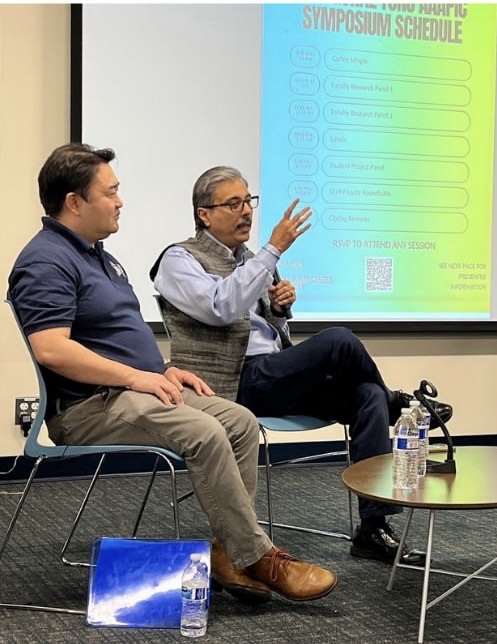An Immigrant’s Journey of Identity, Belonging, and Becoming
Picture courtesy: Asian and Asian American Pacific Islander Coalition at TCNJ
If someone had told me twenty-five years ago that I would one day be standing in front of an audience in the United States, sharing my journey as an immigrant, I would have laughed nervously and changed the subject.
I come from a middle-class family in India. My upbringing was comfortable, deeply rooted in a web of social connections, family influence, and cultural familiarity. In many ways, I was content living within that bubble. Honestly, I never imagined leaving. Why would I? Everything I needed was within reach, and more than that, I had a quiet fear of foreign lands. A fear that I would be singled out, treated as different, and made to feel like I didn’t belong.
But as life would have it, one day my employer—Reliance Industries—sent me to Florida on a short-term assignment. I remember landing in the U.S. with the weight of that fear still sitting heavily on my shoulders. I had imagined it all: the alienation, the stares, the awkward silences. Instead, I found something radically different.
People smiled. Strangers held doors open. Co-workers invited me out, asked about my background with genuine curiosity, not judgment. And perhaps the most surprising of all—I saw people of all races, languages, and religions sharing space with an ease I hadn’t expected. That brief three-month stay changed me. It cracked open the shell of assumptions I had been carrying and replaced them with something new: a sense of comfort, possibility, and belonging.
That experience planted a seed. When I returned to India, the idea of going abroad didn’t seem so far-fetched anymore. And when I received a scholarship offer to pursue a Ph.D. in the U.S., I didn’t hesitate. For the first time, I was choosing the unknown, not out of necessity, but out of a desire to grow.
Arriving as a graduate student was both exhilarating and humbling. I was older than some of my peers, with industry experience behind me, but in many ways, I was starting from scratch. What I found, however, was an academic environment that didn’t care about who I knew or where I came from. It cared about how hard I worked, how deeply I thought, how much I contributed. In that space, merit spoke louder than lineage.
And for the first time in a long time, I felt truly seen—not for my background, not for my accent, not for my clothes—but for my mind, my effort, and my ideas. That feeling of appreciation was transformative. In the U.S., I didn’t just retain my identity—I found it.
I discovered that identity isn’t something static or singular. It’s not a set of boxes you check—it’s a living, breathing thing. In America, I learned to blend my Indian heritage with my growing American sensibility. I still celebrate Diwali with the same joy I did back home. I still cook the food I grew up eating. And I’ve also come to enjoy Thanksgiving dinners and snow-covered Christmas mornings. I didn’t lose who I was—I expanded it.
Assimilation is often misunderstood. It doesn’t mean giving up who you are. It means learning how to carry yourself in new spaces without shedding the skin of your past. I adapted in many ways—yes. I became more direct in communication, more independent in daily life, more open to unfamiliar ideas. But I also held tightly to things that ground me: language, values, music, memories.
Over time, I moved from being a newcomer to becoming part of the fabric. I became a college professor, teaching and mentoring students from all walks of life. It’s a role that constantly reminds me of how far I’ve come—from being the hesitant visitor afraid of feeling different to someone shaping young minds in a land that once felt foreign.
My journey as an immigrant has been one of integration, not erasure. Of growth, not substitution. The United States gave me something invaluable—the freedom to be both Indian and American, the space to express both my inherited and my evolving identities. And in that space, I thrived.
As I close, I want to leave you with this thought: sometimes we find ourselves not by staying where we are, but by stepping into the unknown. And sometimes, the most foreign of places becomes the most familiar, simply because it lets you be who you are.


